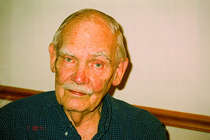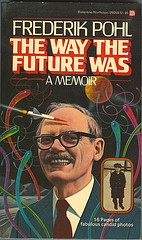Science fiction Grand Master Frederik Pohl died 2 September 2013. A brief announcement on his blog says “Fred went to the hospital in respiratory distress this morning and died this afternoon.” Born in New York City on 26 November 1919, he was an early reader with a love of reading in multiple genres, though he’d make his greatest mark in science fiction. He dropped out of high school at the age of 17 (in 2009, he was awarded an honorary diploma from his high school, Brooklyn Technical), and went on to be self-taught in many fields (he was elected a fellow of the American Association for the Advancement of Science in 1982).
Pohl was one of the early fans, a member of the Futurians and the Hydra Club, and one of the six New Yorkers who traveled to Philadelphia, Pennsylvania, on 22 October 1936 for what has come to be known as the first science fiction convention.
Pohl began writing in the late 1930s, under a variety of pseudonyms, and his first publication as a poem, “Elegy to a Dead Satellite: Luna,” which appeared in the October 1937 issue of Amazing under the byline Elton Andrews. His first story was a collaboration with Cyril M. Kornbluth, “Before the Universe,” which appeared in 1940. He also started working as a literary agent in 1937, and from 1939 to 1941, he edited Astonishing Stories and Super Science Stories. When the US entered World War II, Pohl joined the US Army, and served as a weatherman in Italy.
After the war, he wrote advertising copy, and then returned to working as a literary agent. In the late 1940s, he represented a significant portion of the successful American sf writers, and it was he who sold Isaac Asimov’s first novel, Pebble in the Sky (he was Asimov’s only agent during the latter’s lifetime). Pohl was forced to close his agency in the early 1950s, though he returned to editing magazines, helming both Galaxy and If until 1969 (he took over during H.L. Gold’s final days). Under Pohl’s editorship, If won the Hugo for Best Professional Magazine in 1966, 1967, and 1968. In the 1970s, he was an acquiring editor for Bantam Books, and he was responsible for Samuel R. Delany’s Dhalgren and Joanna Russ’s The Female Man, as well as many others.
His New York Times obituary notes that one of his earliest novels is one of his most famous: The Space Merchants, which he co-wrote with Kornbluth. The Times says that “more than a decade before the surgeon general’s report on smoking and health, the authors imagined a future dominated by advertising executives, who compete to hook consumers on interlocking chains of addictive products.”
His writing career blossomed in the 1970s, when he won the Nebula Award for his novel Man Plus (1976), a cynical novel about the adaptation of a man for life on Mars. Gateway, the first of his Heechee novels, came out the following year, and won the Nebula, the Hugo, and the John W. Campbell Memorial Awards. His SF Encyclopedia entry calls it “almost certainly his best novel,” while the Times describes it as “the story of a man who gains a fortune but loses the love of his life on a prospecting expedition aboard an alien spacecraft — one of many left behind by the mysterious Heechee, who have taken refuge from even more mysterious aliens inside a black hole.” The Times also notes that when Pohl “did make a scientific mistake, he felt compelled to correct it. In the final novel in the Heechee saga, The Boy Who Would Live Forever (2004), he apologized to readers for his original decision to have the aliens hide in a black hole.” In the 1970s, he wrote, black holes were a scientific novelty, but later theory determined that organized matter could not exist inside them, so he “asked his readers to treat this central element in the galaxy-spanning saga as mere fantasy.” His dystopian 1979 novel Jem: The Making of a Utopia, won a National Book Award in the only year it included a science fiction category.
Nearly half of his more than 60 novels were collaborations. His last, the Times reminds us, was The Last Theorem (2008), co-written with Arthur C. Clarke. His web site notes that the novel “grew from 100 pages of notes Arthur C. Clarke gave to Frederik Pohl [Clarke died in early 2008]. With the help of Elizabeth Anne Hull, Pohl completed a story of mathematics, political intrigue, and a threat to the survival of Earth.”
Pohl also published more than 20 collections of his short fiction, and wrote a great deal of non-fiction as well. In addition to his memoir The Way the Future Was (1978), he wrote a biography of Roman emperor Tiberius (1960), Chasing Science: Science as a Spectator Sport (2000), Our Angry Earth: A Ticking Ecological Time Bomb (1991, co-written with Isaac Asimov), and nearly a dozen others.
Pohl’s career awards include:
* SFWA Grand Master Award (1993)
* Science Fiction Hall of Fame Living Inductee (1998)
* Theodore Sturgeon Memorial Award for Distinguished Service (2013)
* Prix Utopia for Life Achievement (2000)
His ten Nebula Award nominations include two wins, for Gateway (1978) and Man Plus (1977).
His ten writing Hugo nominations include four wins:
* Fan Writer (2010)
* Short Story (“Fermi and Frost”, 1986)
* Novel (Gateway, 1978)
* Short Story (“The Meeting” co-authored with C.M. Kornbluth, 1973)
Pohl was married five times: to fellow fan Leslie Perri (1940-44); to Dorothy LesTina (1945-47); to editor Judith Merril (1948-52), with whom he had a daughter; to Carol M. Ulf Stanton (1953-83), with whom he had three children; and to Elizabeth Anne Hull, PhD (married in 1984, she survives him, as do three of his children).

